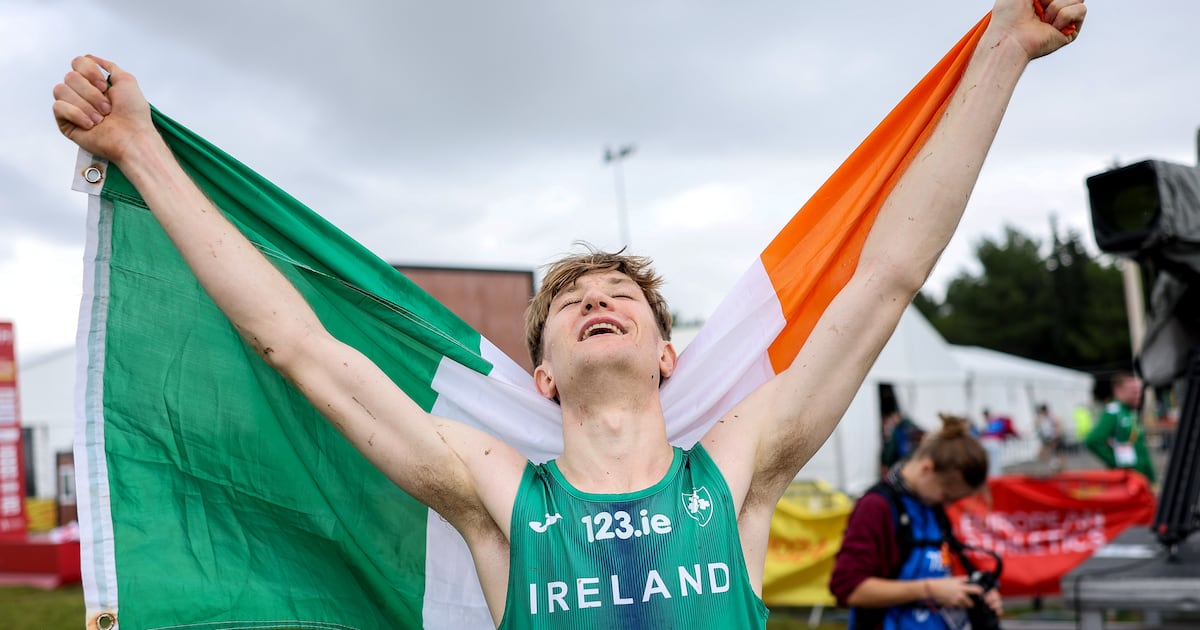The worst thing Nick Griggs could have done after being told his left knee was seriously infected was to consult Dr Google. Especially for something like osteomyelitis, which he had never heard of. Nobody knew for sure what impact it might have on a young, super-fit runner such as himself.
Even at this stage, almost eight months later, Griggs isn’t certain about how it got infected, other than it all started at the European Cross Country Championships in Antalya, Turkey, on December 8th, 2024. Within a month he was unable to bend his knee. He was a 20-year-old professional athlete who could hardly get out of bed. The throbbing pain was well beyond his high tolerance for suffering.
Griggs ran a 3:56.40 mile indoors in 2022, less than three months after turning 17, a European Under-20 record at the time. Achieving that time hurt, if mostly in a good way.
In Antalya, Griggs was pushed to the ground from behind, shortly after the gun was fired in the Under-23 race. His left knee took the brunt of his fall. That kind of thing happens, so he immediately got up, chased down the leaders and went on to finish a close second. It was his eighth European underage medal between track and cross-country.
“I managed to do three weeks of full training right after Euro Cross and remember thinking ‘my knee still doesn’t feel right here’,” he said. “But as an athlete, you pick up niggles like that all the time.”
The sense of lasting disbelief about what unfolded next is still audible in his voice.
“By Christmas, an awkward time anyway, I knew it wasn’t right, went for an MRI scan and they reckoned it was bone bruising. I’d probably miss the indoor season, but would be fine in a few weeks. Then we did another scan a week later, a CT scan this time, to make sure the bone wasn’t cracked. And it wasn’t. So [I was] happy with that. But the doctor mentioned on the phone it might be osteomyelitis, a bone infection.
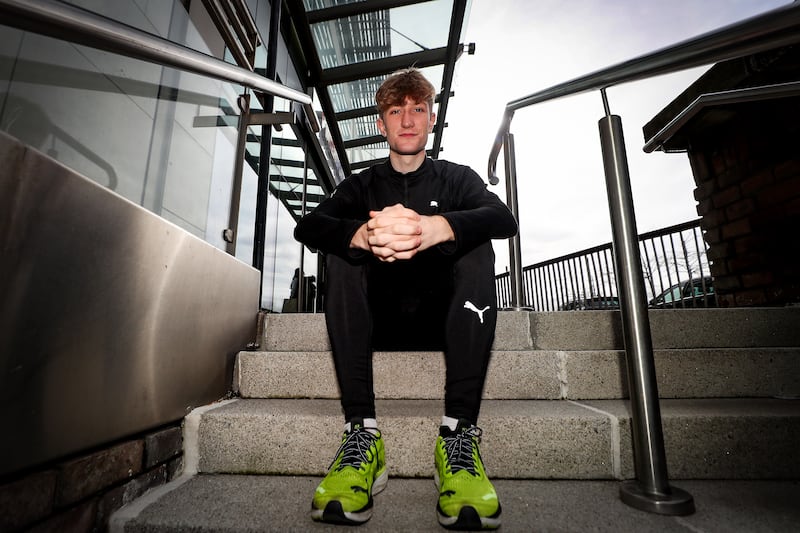 Nick Griggs is getting back in the groove after recovering from osteomyelitis. Photograph: Bryan Keane
Nick Griggs is getting back in the groove after recovering from osteomyelitis. Photograph: Bryan Keane
“So, instantly I go to Dr Google, trying to find out more. And one of the things it says is ‘20 per cent chance of death’. I was like ‘what?’. I don’t know where that statistic came from, because it’s obviously not true.
“But it very quickly went from a running injury to a serious medical illness. Then they started throwing out words like ‘prognosis’ and my only experience of prognosis is for someone who has cancer. They kept saying, ‘if we get this sorted now, the prognosis is good for the rest of your career’.
“That’s when it really hit me – ‘oh s**t, I really need to listen to everything they say’. Of course there’s the mental worry. This is your career, your life. This is what I want to do for the foreseeable future.”
Osteomyelitis is a bacterial or fungal infection of the bone marrow. If left untreated, it can result in permanent bone or joint damage, with amputation necessary in a worst-case scenario. Griggs was spared that terrifying prospect thanks to relatively early intervention. The infection did not spread beyond his kneecap.
Still, it laid bare how quickly fortunes can turn, especially after Griggs enjoyed another breakthrough season in 2024, running 3:35.04 for 1,500m, 7:36.59 for 3,000m and 13:13.07 for 5,000m – each time destroying the Irish Under-23 records, just like he had done at Under-20 level.
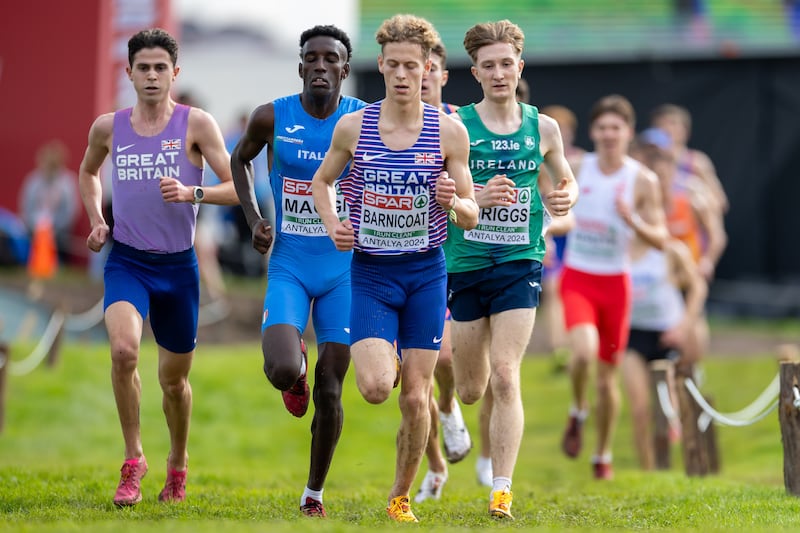 Ireland’s Nick Griggs on his way to winning silver at the European Cross Country Championships in Turkey last December, where he first became aware there was an issue with his knee.
Ireland’s Nick Griggs on his way to winning silver at the European Cross Country Championships in Turkey last December, where he first became aware there was an issue with his knee.
Photograph: Morgan Treacy/Inpho
This setback might well test his mental resilience too, only Griggs has already been through an awful lot worse on that front. Some people will recall when he first announced himself as a running prodigy, aged 16, coming out of the small village of Newmills, east Co Tyrone, running in the colours of Mid Ulster AC.
Griggs managed to convince the organisers of a senior 5,000m race in Belfast to accept his entry, after his older brother and only sibling Josh made a video recording of him running 8:20 for 3,000m in training. Nick Griggs duly produced a startling time of 14:15.98. With that, his running potential – which he honed during the pandemic − was abundantly clear.
By that stage, Griggs had hung up his boots from his underage playing days at Brackaville Owen Roes GAA club. His brother Josh, one of Nick’s strongest supporters, played on with the club and fully backed his decision to focus on running.
One month after his breakthrough run in Belfast, Nick Griggs and his parents, Andy and Royanne, received the devastating news that Josh had been killed in a work-related accident in Banbridge, Co Down. He was 19.
Griggs resolved to find motivation in grief; to honour his brother by making the most of his running.
Two weeks after Josh’s funeral, Griggs was back on the track, running away with the Irish Under-20 3,000m title, clocking 8:11.15. That July, less than six weeks after losing his brother, he won the European Under-20 3,000m gold medal in breathtaking style. He was still only 16.
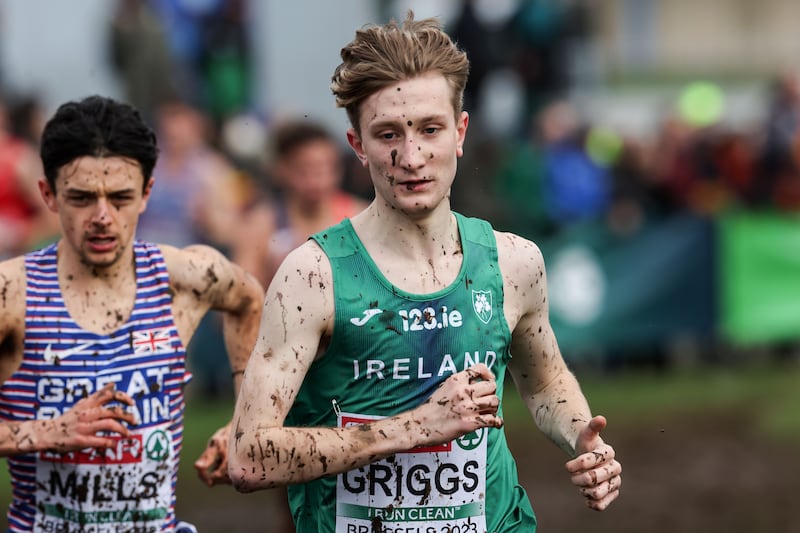 Nick Griggs in the thick of it during the 2023 European Cross Country Championships in Belgium. Photograph: Morgan Treacy/Inpho
Nick Griggs in the thick of it during the 2023 European Cross Country Championships in Belgium. Photograph: Morgan Treacy/Inpho
Griggs turned 20 last December 18th. He sometimes jokes with his mother about his birth date, suggesting he would have been better off if she gave birth on the due date in early January. That would have afforded him another year in the Under-20 grade, given it’s the year of birth that counts.
Even when properly diagnosed with osteomyelitis, his ordeal was far from over. He spent two weeks in Musgrave Park Hospital in Belfast and was discharged on St Valentine’s Day. He missed three full months of running and it took him almost seven months to get back racing.
“I’d never been to hospital before, but this meant a PICC (peripherally inserted central catheter) line into my arm, and antibiotics that way, twice a day, for two weeks. Then another four weeks of oral antibiotics. But look, the staff were lovely, and because I was a sepsis risk, I had my own room, so about as nice an experience as you could want, even in the circumstances, and obviously I can’t thank them enough.
“Even now, we still don’t know if I just bruised the knee at Euro Cross, kept training on it, which caused the fluid build-up, then that got infected. But it reached the point I’d be lying in bed at night, knee throbbing in pain, couldn’t even sleep. It was a nightmare like that, not even thinking about running or having a season. I just didn’t want to be in pain; it was really, really sore.”
While in hospital, his coach Mark Kirk, the Irish 800m champion in 1988, gently told him that this summer’s European Under-23 Championships in Bergen, Norway, might come too soon. Griggs agreed getting his health right was his only priority, but he didn’t give up hope either.
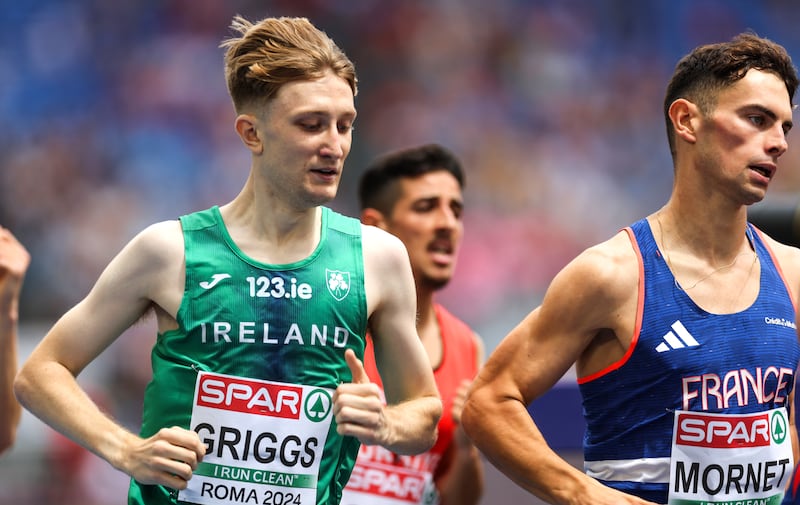 Ireland’s Nick Griggs on the way to finishing 14th in the 1,500m semi-final at the 2024 European Athletics Championships in Rome. Photograph: Morgan Treacy/Inpho
Ireland’s Nick Griggs on the way to finishing 14th in the 1,500m semi-final at the 2024 European Athletics Championships in Rome. Photograph: Morgan Treacy/Inpho
His first run, on St Patrick’s Day, was near torture. It was four miles at a pace of 7.30, with his heart rate still soaring to 168 bpm. When he came out of hospital, a measurement of his left quad muscle showed that it was down to 44cm, compared to his right quad of 50cm, so there was a lot of wastage to make up there too.
Things quickly turned around when Griggs went for five weeks of altitude training in Font-Romeu in the French Pyrenees, with a large group from Athletics Ireland: “I went from 27 miles a week back up to 85 miles,” he said. “[I was] on the bike a bit as well, and luckily came off that in May feeling pretty good. Being with a group helped me get the love of running back too.”
After a few comeback races, including a 3:52 mile in Santry, he then came out at the European Under-23 Championships two weeks ago and won the silver medal in the 5,000m, only being denied gold by rising Dutch star Niels Laros.
Griggs will race the 1,500m at this weekend’s National Championships in Santry. With four senior silver medals to his name already, between indoors and outdoors, he won’t be lacking in motivation. Even more importantly perhaps, his recent brush with illness has given him a greater appreciation for the sport he’s always loved.
“I remember with 200m to go, in the Morton Mile, I felt absolutely class, was thinking ‘I’m definitely back’. I still think the best is yet to come for me this season.
“But it’s definitely given me some fresh gratitude, that I am living my dream, but to remember that can always be taken away. And you have to appreciate the good times when they come around again.”

